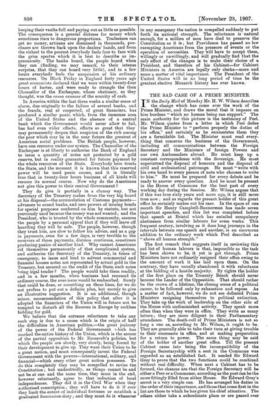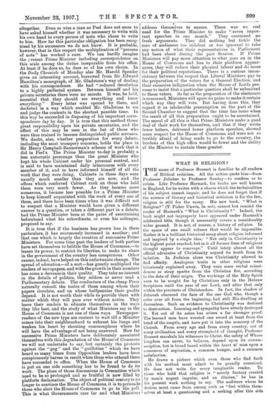THE SAD CASE OF A PRIME MINISTER.
IN the Daily Mail of Monday Mr. H. W. Wilson describes the change which has come over the work of the Prime Minister, and draws the moral that it imposes on him burdens " which no human being can support." The main authority for this picture is the testimony of Peel. Mr. Wilson quotes from a letter in which Peel defies the Prime Minister to " perform properly the duties of his office," and certainly as he enumerates them they are a formidable list. The Minister must read every- thing that concerns the business of the Government, including all communications between the Foreign Secretary and the Ministers of foreign Powers and our own Ambassadors abroad. He must keep up a constant correspondence with the Sovereign. He must superintend the disposal of honours and the disposal of civil and ecclesiastical patronage. He must " write with his own hand to every person of note who chooses to write to him." He must be prepared for every debate and be ready to answer every question. And he must be present in the House of Commons for the best part of every working day during the Session. Mr. Wilson argues that if this was true sixty years and more ago, it is still more true now ; and as regards the present holder of this great office he certainly makes out his case. In the space of one month Sir Henry Campbell-Bannerman has made seven important speeches, and this list was completed before that speech at Bristol which has entailed compulsory abstinence from similar labours for some weeks. This frequent oratory, involving as it does long journeys in the intervals between one speech and another, is an enormous addition to the ordinary work which Peel described as " above all human strength."
The first remark that suggests itself in reviewing this sad list of human labours is that, impossible as the task has been shown to be, it yet is got through. Prime Ministers have not ordinarily resigned their office owing to the amount of work it has laid upon them. On the contrary, they have usually abandoned it with reluctance at the bidding of a hostile majority. By rights the bolder of the first place on the Treasury Bench should never become the Leader of the Opposition. That should rather be the crown of a lifetime, the closing scene of a political career, to be followed only by exhaustion and repose. As a matter of fact, however, we do not see defeated Prime Ministers resigning themselves to political extinction. They take up the work of leadership on the other side of the House with undiminished activity. They speak more often than when they were in office. They write as many letters ; they are more diligent in their Parliamentary attendance. The death-roll of Prime Ministers is not so long a one as, according to Mr. Wilson, it ought to be. They are generally able to take their turn at giving trouble to their successors in office, and at making preparation for a return to power. The same thing may be said of the holder of another great office. Till the present Cabinet came into being the incompatibility of the Foreign Secretaryship with a seat in the Commons was regarded as an established fact. It needed Sir Edward Grey to prove that the two functions could be combined without real difficulty. When next a Cabinet has to be formed, the chances are that the Foreign Secretary will be either a Peer or a Commoner, according as the post can be the more fittingly filled from either House. Sir Edward Grey's secret is a very simple one. He has arranged his duties in the order of their importance, and those that come first in the list are those to which he has given his chief attention. The others either take a subordinate place or are passed over altogether. Even so wise a man as Peel does not seem to have asked himself whether it was necessary to write with his own hand. to every person of note who chose to write to him. How far this particular obligation has been recog- nised by his successors we do not know. It is probable, however, that in this respect the multiplication of "persons of note " has worked a cure. We can hardly imagine the present Prime Minister including correspondence on this scale among the duties inseparable from his office. At least if he does so, he does so of his own choice. In the Daily Chronicle of Monday also Mr. Harold Spender gives an interesting account, borrowed from Sir Edward Hamilton's monograph, of Mr. Gladstone's way of dealing with his correspondence. He had " reduced devolution to a highly perfected system. Between himself and his private secretaries there were no secrets. It was, he held, essential that they should see everything and know everything." Every letter was opened by them, and docketed in a way which enabled Mr. Gladstone to see and judge the contents in the shortest possible time. In this way he succeeded in disposing of his important corre- spondence day by day. It is true that this method threw great responsibility upon his private secretaries, and the effect of this may be seen in the list of those who were thus trained to become distinguished public servants. We doubt, also, whether preparation for every debate, including the most trumpery concerns, holds the place in Sir Henry Campbell-Bannerman's scheme of work that it did in Peel's. The Prime Minister to-day is probably a less autocratic personage than the great Minister who kept his whole Cabinet under his personal control, and is said to have maintained daily intercourse with every member of it, and to have informed himself of all the work that they were doing. Cabinets in those days were usually much smaller than they are now, and the offices which conferred Cabinet rank on those who held them were very much fewer. As they became more numerous, it became less possible for a Prime Minister to keep himself acquainted with the work of every one of them, and there have been times when it was difficult not to suspect that a Minister would have given a different answer to a question, or taken a different part in a debate, had the Prime Minister been at the pains of ascertaining beforehand what his subordinate, or even his colleague, proposed to say.
It is true that if the business has grown less in these particulars, it has enormously increased in another ; and that one which is largely the creation of successive Prime Ministers. For some time past the leaders of both parties have set themselves to belittle the House of Commons,—to lessen its power, to restrict its liberties, to make its share in the government of the country less conspicuous. Other causes, indeed, have helped on this unfortunate change. The spread of education—of a sort—has greatly multiplied the readers of newspapers, and with the growth in their numbers has come a decrease in their quality. They take no interest in the details of politics, they seldom or never read a Parliamentary debate. The conductors of the cheap Press naturally consult the tastes of those among whom their papers circulate, and on whose halfpennies their profits depend. It is not worth their while to provide them with matter which they will pass over without notice. They leave their readers to educate themselves in the ways they like best; and the study of what Ministers say in the House of Commons is not one of these ways. Newspaper- readers of the new type are content to wait till a Minister comes into their neighbourhood to exhaust his lungs and weaken his heart by shouting commonplaces where he will have the advantage of not being answered. How far successive Prime Ministers have deliberately associated themselves with this degradation of the House of Commons we will not undertake to say, but certainly the protests against the " gag " and the " guillotine " which we have heard so many times from Opposition leaders have been conspicuously barren in result when those who uttered them have succeeded to office. When, the House of Commons is put on one side something has to be found to do its work. The place of those discussions in Committee which used to be so prolonged and so fruitful is now filled by platforin declamation. The object of political oratory is no longer to convince the House of Commons, it is to persuade those who elect the House of Commons to go to the poll. This is what Governments care for and what Ministers address themselves to ensure. There was no real need for the Prime Minister to make " seven impor- tant speeches in one month." They contained no fresh arguments. They did nothing but tickle the ears of audiences too indolent or too ignorant to take any notice of what their representatives in Parliament had been about during the past Session. If Prime Ministers will pay more attention to what goes on in the House of Commons and less to their platform appear- ances, they will reduce their physical labour and do more for their political reputations. There is a curious incon- sistency between the respect that Liberal Ministers pay to the preparation of the voters for a General Election, and their excessive indignation when the House of Lords pre- sume to insist that a particular question shall be submitted to these voters. So far as the preparation of the electorate is concerned, Ministers will spare no pains to make it certain which way they will vote. But having done this, they regard it as intolerable presumption on the part of the Second Chamber to suggest that the time has come when the result of all this preparation ought to be ascertained. The moral of all this is that Prime Ministers make a good deal of their work for themselves, and that if they wrote fewer letters, delivered fewer platform speeches, showed more respect for the House of Commons, and were not so terribly afraid of being made to go to the country, the burdens of this high office would be fewer and the ability of the Minister to sustain them greater.



















































 Previous page
Previous page